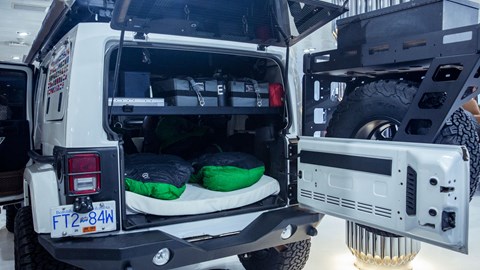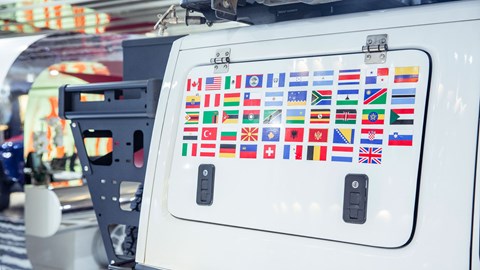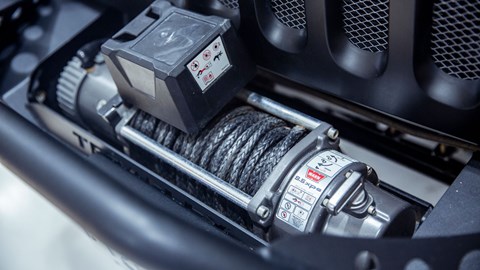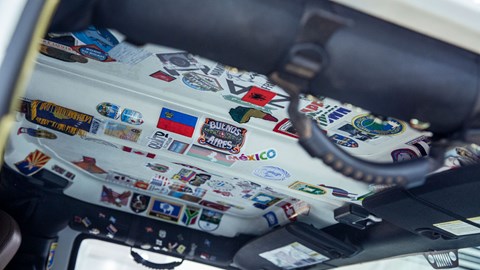► Three-year, 200,000-mile adventure will take in all seven continents
► Jeep Wrangler Rubicon – modified for living in – is going strong
► Couple decided to do the trip on only their second date
Delete as applicable. (1) The world is a terrifying place full of people out to rip you off, and it’s crumbling all around us. (2) The world is place of endless beauty and wonder, full of people pleased to meet you and keen to help you.
One glance at these photos tells you that we’re here firmly in Option 2. Expedition Earth consists of a couple who personify the idea that good things happen to good people. Topher Richwhile, 33, and Bridget Thackwray, 25, both originally from New Zealand, both very successful in their chosen fields, both travelled widely before they met while both living in London. On only their second date they decided to drive around the world. Most people who decide to do that quickly undecide it the next day. Not these two.

Topher told us: ‘We could have spent a lot more time preparing and organising, but it was my dad who said just go, and that was exactly the right thing to do. We’re not dead yet. And the experience we’ve gained may be preparing us for coping with a really bad incident if that ever does arise.’
The crucial third member of the team is Gunther, their modified Jeep Wrangler Rubicon. There’s a non-twee reason for their car’s name: it’s a tribute to Gunther Holtorf, a German who over the course of 26 years drove 549,000 miles around the world in a Mercedes G-Wagen, much of it with his wife Christine. She’s now dead, but he’s still active, and has recently agreed to meet up with Expedition Earth.

Topher and Bridget have split their journey into three chunks, with breaks built-in to allow time to modify the car, recharge their batteries and sort out visas and other dull but vital paperwork.
The first leg started with their car standard, aside from a roof rack and tyres suitable for the snow. Their journey took them down the Americas from north to south. They camped most nights, but in colder conditions they can use the back of the Jeep as a bed; with the rear seats folded it’s big enough for 6ft 5in Topher to stretch out.
They soon acquired a bigger roof rack, bigger wheels, different shocks, a lot of boxes for luggage, a winch, a snorkel, lots of lights, plus containers for fuel and water.
Gunther was shipped to southern Africa for leg two, up into Europe; we met up with them at Motor Village Marylebone, the Jeep dealers around the back of Selfridges.
Topher told us: ‘The car’s been great. We’ve had four punctures, and that’s about the only problem, except when we had to get the fuel drained after we used the wrong filter inEcuador. We’re not mechanics. We’re learning as we go along, but not much has gone wrong so we’re not learning that much.

‘We’ve got repair kits and recovery kits but we don’t really know how to use them.
‘In South America we were badly organised and it wasn’t easy to find food on the way. But for leg two, Africa and Europe, we had a fridge in the back. That’s come out again as we won’t need it in Scandinavia and Russia.
‘For the next leg we’ll have heaters, one in the rear footwell to keep us alive while we’re sleeping in the back in sub-zero temperatures, and one in the engine bay to stop it freezing. We’re also going to need trip wire in lots of places because of polar bears.’
After Russia, the third leg takes them through Central Asia, then south-east towards Australia and finally home to New Zealand. If all goes to plan, they’ll have clocked up three years and more than 200,00 miles in Gunther.

As you’ll see from the stickers on their car, the route has taken in some places that aren’t for the faint of heart. There have been some close shaves – three days after they left Khartoum, the capital of Sudan, there was a rebel attack that left many dead – but Topher says there was only one occasion when they actually feared for their lives. ‘There was an incident in Ethiopia when six young guys in uniform approached, armed, and ordered me out of the car. You get a lot of roadblocks in Africa, but this one felt different, serious. I didn’t know what they wanted. But then a crowd gathered round and it defused the situation. I think we might have had a lucky moment.’
Their photos emphasise the glories of the natural world. ‘The landscapes do all the talking. We try to keep man-made structures out of the photos – we want to celebrate nature.’